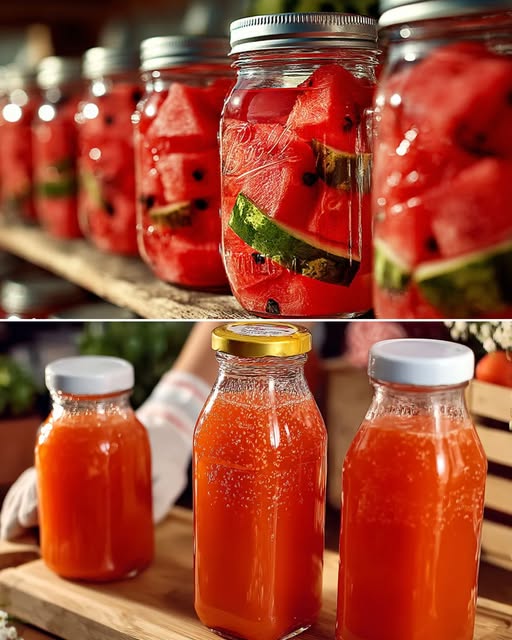Discover the time-honored Amish techniques for preserving watermelon that keeps it fresh and delicious for years without refrigeration. These traditional methods transform seasonal abundance into year-round nourishment, allowing you to enjoy the sweet taste of summer watermelon even in the depths of winter. The secret lies in proper acidification and salt brining that creates an environment where harmful bacteria cannot survive while maintaining the fruit’s natural flavor and nutritional value.
Ingredients for Canned Watermelon
- 1 large watermelon (4-5 kg / 9-11 lbs), washed with baking soda
- 6 tbsp granulated sugar (90g / 3.2 oz)
- 2 tbsp salt (30g / 1 oz)
- 2 tsp citric acid (10g / 0.35 oz)
- Boiling water as needed
- Clean 2.5L (85 oz) glass canning jars with new lids
Ingredients for Watermelon Juice
- 1 large watermelon (4-5 kg / 9-11 lbs), washed
- Juice of 2 lemons (60ml / 4 tbsp)
- Sterilized glass bottles with lids
Instructions for Canned Watermelon
- Prepare watermelon: Wash watermelon rind thoroughly with baking soda to remove any surface contaminants. Rinse well and dry.
- Cut watermelon: Slice watermelon into manageable pieces, then cut into chunks that will fit easily into jars while maintaining some structure.
- Fill jars: Pack watermelon pieces into clean, sterilized 2.5L jars, leaving about 1 inch headspace at the top.
- First water treatment: Pour boiling water over watermelon pieces to cover completely. Cover jars with lids and let rest for 20 minutes.
- Prepare brine: After 20 minutes, pour the water from jars into a large pot. Add sugar, salt, and citric acid to the watermelon-infused water.
- Boil brine: Bring the seasoned water to a rolling boil, stirring to dissolve all ingredients completely.
- Fill and seal: Immediately pour the hot brine back into jars, covering watermelon completely. Seal with clean, new lids.
- Cool and store: Allow jars to cool gradually to room temperature. Store in a dark, cool place for up to 2 years.
Instructions for Watermelon Juice
- Prepare watermelon: Wash watermelon thoroughly and cut in half. Remove the red flesh, discarding rind and white parts.
- Blend fruit: Cut watermelon flesh into chunks and blend in batches until completely liquefied.
- Strain juice: Pass blended watermelon through a fine-mesh strainer into a deep pot, removing all seeds and pulp.
- Add lemon juice: Stir in fresh lemon juice to acidify and preserve the natural color.
- Heat juice: Bring juice to a boil over medium heat, skimming foam as it forms on the surface.
- Prepare bottles: Sterilize glass bottles in 100°C (212°F) oven for 30 minutes. Sterilize lids in boiling water for 15 minutes.
- Fill bottles: Pour hot juice into sterilized bottles, leaving 1/2 inch headspace. Seal immediately with sterilized lids.
- Cool and store: Allow bottles to cool gradually and store in a dark, cool place for up to 1 year.
Time and Serving Information
Prep Time: 45 minutes
Processing Time: 40 minutes
Cooling Time: 2 hours
Total Time: 3 hours 25 minutes
Yield: 2 large jars watermelon, 3-4 bottles juice
Nutrition (per 1 cup canned watermelon): Calories: 65, Protein: 1g, Carbs: 16g, Fat: 0g, Fiber: 1g, Vitamin C: 12mg
Nutrition (per 1 cup juice): Calories: 48, Protein: 1g, Carbs: 12g, Fat: 0g, Vitamin A: 865 IU
Why This Recipe is Good and Healthy
These traditional Amish preservation methods offer remarkable health benefits while extending the life of seasonal produce. Watermelon is naturally rich in lycopene, a powerful antioxidant that supports heart health and may reduce cancer risk. The fruit also provides significant amounts of vitamin C for immune function and vitamin A for eye health. The canning process preserves most of these beneficial compounds while creating shelf-stable nutrition that doesn’t require refrigeration. The salt and citric acid create an acidic environment that prevents harmful bacteria growth while maintaining food safety. Unlike commercial preserved fruits that often contain excessive sugar and artificial preservatives, this method uses minimal added ingredients, allowing the natural sweetness and nutrients of watermelon to shine through. The high water content and natural electrolytes make both the canned watermelon and juice excellent for hydration and supporting kidney function. These preservation techniques reduce food waste, provide access to fresh fruit nutrition year-round, and connect us to sustainable food practices that have nourished communities for generations.
